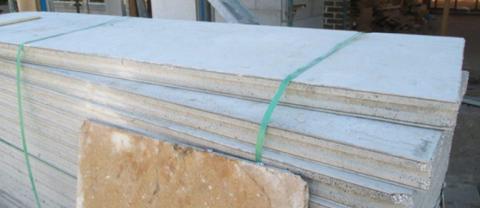Purpose
This safety alert highlights the asbestos exposure risks associated with fibrous building panels imported to construct a residential building.
Background
A prohibition notice was issued to a building site in Sydney by WorkCover NSW, in August 2015, following the discovery of asbestos in fibrous building panels imported to construct a residential building.
The panels were imported from China and were thought to be asbestos-free, but subsequent testing by the National Association of Testing Authorities (NATA) has shown they contain chrysotile asbestos.
The expanded polystyrene (EPS) panels have been cut, and therefore significantly damaged on-site, with the builder ordered to engage a licensed asbestos removalist to remediate the site and remove the remaining panels.

While asbestos has been a prohibited product in Australia since December 2003, in many countries it is still used in manufactured products. Certification provided to importers from overseas manufacturers that goods are asbestos-free have sometimes found to be wrong for the purposes of our regulations.
The use of all forms of asbestos has been banned in Australia since the end of 2003. This means that the import, manufacture, supply, sale and use or reuse of asbestos and asbestos-containing products is no longer permitted, except under very limited circumstances.
Local standards in some supplier countries may classify goods ‘asbestos free’ where they meet a certain low level of asbestos content. In Australia, a product found with any level of asbestos is prohibited for import or use.
Action required
Importers should be aware of the varying definitions and standards applied in the country of origin and/or supply. Australian regulations apply at the border.
The importer must ensure they do not import asbestos into Australia. They should:
- request certification from the manufacturer that the goods are asbestos-free
- obtain evidence from the overseas supplier (e.g. product testing results that the product/material does not contain asbestos)
- arrange a competent person to sample the goods/materials for testing by a laboratory prior to shipping (It is recommended that a NATA accredited laboratory, accredited for the relevant test method (AS 4964 Method for the qualitative identification of asbestos in bulk samples), or internationally equivalent laboratories be used).
Note: the cost of any tests or verification measures undertaken will be borne by the importer.
To reduce the risk of importing or supplying products containing asbestos, read Raising awareness about the risk of imported products containing asbestos.
Information includes:
- how the importation of asbestos is regulated at the Australian border and the products at particular risk of containing asbestos
- what businesses must do to ensure imported products do not contain asbestos
- types of verifications that exist for Australian importers or consumers to show imported materials do not contain asbestos.